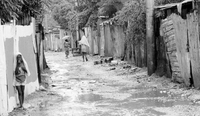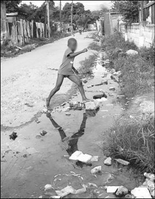Poor, broken & missing - Majority of children abducted since the start of the year come from families that fall within the lower socio-economic groups
Published: Sunday | November 22, 2009

WHILE Recently released data from the Planning Institute of Jamaica (PIOJ) show an upward swing in Jamaica's poverty line and a reduction in the number of people going hungry, a strong link is being made between missing children and poverty levels.
The data show that the prevalence of poverty dropped from 18.7 per cent in 2000 to 9.91 per cent in 2007. Similarly, prevalence of food poverty fell from 4.9 per cent to 2.78 per cent during the same period.
At the same time, the unit in the Department of Local Government that manages the Ananda Alert - a nationwide missing children repor-ting system - has revealed that since the start of the year, the majority of children who go missing are "driven" from home because of poor economic circumstances which deprive them of some basic needs.
"It is very frightening," said Wayne Robertson, senior director of strategic policy, planning and reform at the Department of Local Government in the Office of the Prime Minister, referring to the trend. He also pointed out that authorities had noticed this pattern years prior to 2009.
Up to press time, the last three notifications issued through the Ananda Alert were of children who lived in working-class communities of Newlands in Portmore, St Catherine, Dumfries Crescent in St Thomas, and the Cross Roads area in St Andrew.
Up to September this year, 1,206 children were reported missing. Of that figure, 676 have returned home, while three have died. The frightening figures for this nine-month period far outstrip the 960 children reported missing during 2008.
"Many of these children run away from home because they are not comfortable," Robertson told The Sunday Gleaner.
family life breakdown
He argued that the children from working-class homes are the most vulnerable in society because of the breakdown in family life. Many of the homes, he said, are single-parent households (mostly mothers only) that, unlike their upper middle-class and upper-class counterparts, lack the financial means to implement security mechanisms, such as dropping off or picking up their children from school.
Robertson also pointed out that the needs brought on by the dire financial straits buffeting the coffers of these lower middle-class homes often result in parents sending the children out on the streets to sell quick-cash items in a desperate bid to supplement the family's already thin disposable income.
"These children are very much at risk. The vulnerability is further advanced with their exposure out there in the public domain," said Robertson.
leave voluntarily
At the same time, Betty-Ann Blaine, convenor of children's advocacy group, Hear the Children's Cry, told The Sunday Gleaner that her team contacted more than 950 of the families who had reported a child missing since the beginning of 2009, and the results showed that most of the children who go missing are not abducted, but leave home voluntarily. "But the parents don't know where they are so they report them missing.
"They (children) are unhappy at home for a variety of reasons, including physical and sexual abuse ... Quite a number of them are (also) being lured by older men," she said.
Blaine blames a breakdown in family life and the prevalence of poverty for the staggering statistics on missing children. "Many children are going missing because they don't have certain material things. They are leaving home because they are hungry and in need of material things like clothes, books."
Blaine, an ardent advocate for children's welfare, insists that missing children in Jamaica is a "phenomenon" that does not affect the upper classes. "It is the children of the poor and the children of the working class who go missing. It's one hundred per cent a problem of the poor and working class," she said.
She is recommending that the police increase their presence in the vicinity of schools during the hours that children travel to and from school, with specifically marked vehicles being used for the the patrols. Blaine also urges students to walk in groups and encourage parents to form volunteer patrols that meet the children who go to school within or near to their communities and ensure that they make it home safely.
tyrone.reid@gleanerjm.com

Children from the lower-income strata of society are more likely to go missing because of the poor circumstances under which they live.- File photos







